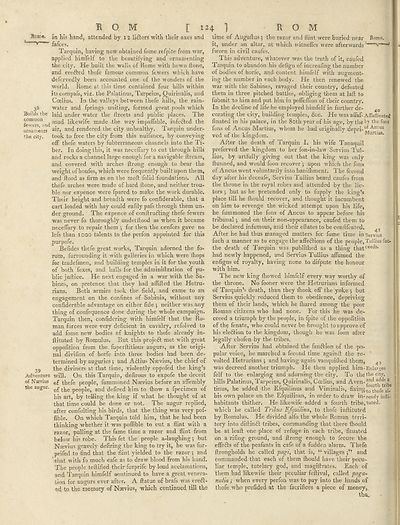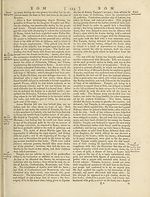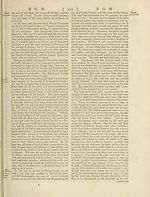Encyclopaedia Britannica, or, a Dictionary of arts, sciences, and miscellaneous literature : enlarged and improved. Illustrated with nearly six hundred engravings > Volume 18, RHI-SCR
(132) Page 124
Download files
Complete book:
Individual page:
Thumbnail gallery: Grid view | List view

ROM [ 124 1 ROM
Some. ;n his hand, attended by 1 2 li&ors with their axes and
fafCes.
Tarquin, having now obtained fome refpite from war,
applied bimfelf to the beautifying and ornamenting
the city. He built the walls of Rome with hewn Hone,
and ereffed thofe famous common few’ers which have
defervedly been accounted one of the wonders of the
world. Rome at this time contained four hilR within
itscompafs, viz. the Palatinus, Tarpeius, Quirinalis, and
Coelius. In the valleys between thefe hills, the rain-
38 water and fprings uniting, formed great pools which
Builds the lajj under water the ilreets and public places. The
fewer-^ind lnud niade the way impaffable, infe&ed the
ornaments a*rt an(^ rendered the city unhealthy. Tarquin under-
?he city. took to free the city from this nuifance, by conveying
off thefe waters by fubterraneous channels into the Ti¬
ber. In doing this, it was neceffary to cut through hills
and rocks a channel large enough for a navigable Itream,
and covered with arches ftrong enough to bear the
weight of houfes, which were frequently built upon them,
and Hood as firm as on the moft folid foundations. All
thefe arches were made of hard done, and neither trou¬
ble nor expence were fpared to make the work durable.
Their height and breadth were fo confiderable, that a
cart loaded with hay could eafily pafs through them un¬
der ground. The expence of conftrufting thefe fewers
was never fo thoroughly underdood as when it became
necedary to repair them ; for then the cenfors gave no
lefs than 1000 talents to the perfon appointed for this
thefe great wmrks, Tarquin adorned the fo¬
rum, furrounding it with galleries in which were drops
for tradefmen, and building temples in it for the youth
of both fexes, and halls for the adminidration of pu¬
blic judice. He next engaged in a war with the Sa¬
bines, on pretence that they had adided the Hetru-
rians. Both armies took the field, and came to an
engagement on the confines of Sabinia, without any
confiderable advantage on either fide •, neither was any
thing of confequence done during the whole campaign.
Tarquin then, confidering with himfelf that the Ro¬
man forces were very deficient in cavalry, refolved to
add fome new bodies of knights to thofe already in-
dituted by Romulus. But this project met with great
oppofition from the fuperditinus augurs, as the origi¬
nal divifion of horfe into three bodies had been de¬
termined by auguries ; and Adtius Naevius, the chief of
-9 the diviners at that time, violently oppofed the king’s
Adventure will. On this Tarquin, defirous to expofe the deceit
of Naevius ef thefe people, fummoned Naevius before an aflembly
the augur. ^ pe0p]e? an(j defired him to (how a fpecimen of
his art, by telling the king if what he thought of at
that time could be done or not. The augur replied,
after confulting his birds, that the thing was very pof-
fible. On which Tarquin told him, that he had been
thinking whether it was poffible to cut a flint with a
razor, pulling at the fame time a razor and flint from
below his robe. This fet the people a-laughing •, but
Naevius gravely defiring the king to try it, he was fur-
prifed to find that the flint yielded to the razor •, and
'/that with fo much eafe as to draw blood from his hand.
The people teftified their furprife by loud acclamations,
and Tarquin himfelf oontinued to have a great venera¬
tion for augurs ever after. A ftatue of brafs was ereft-
s4 to the memory of Nsevius, which continued till the
purpofe.
Befid
time of Auguflus ; the razor and flint were buried near Rome,
it, under an altar, at which witnefles were afterwards
fvvorn in civil caules.
This adventure, whatever was the truth of it, caufed
Tarquin to abandon his defign of increafing the number
of bodies of horfe, and content himfelf with augment¬
ing the number in each body. He then renewed the
war with the Sabines, ravaged their country, defeated
them in three pitched battles, obliging them at laft to
fubmit to him and put him in poffefiion of their country.
In the decline of life he employed himfelf in further de- 40
corating the city, building temples, &c. He was affaf-Affaffinated
finated in his palace, in the 80th year of his age, by theby the Ions
fons of Ancus Martius, whom he had oripinally denri-0* Ancus
ved of the kingdom. Martius.
After the death of Tarquin I. his wife Tanaquil
preferved the kingdom to her fon-in-law Setvius Tul¬
lius, by artfully giving out that the king was only
ftunned, and would foon recover j upon which the fons
of Ancus went voluntarily into baniflnnent. The fecond
day after his deceafe, Servius Tullius heard caufes from
the throne in the royal robes and attended by the lie-
tors ; but as he pretended only to fupply the king’s
place till he (hould recover, and thought it incumbent
on him to revenge the wicked attempt upon his life,
he fummoned the fons of Ancus to appear before his
tribunal 5 and on their non-appearance, caufed them to
be declared infamous, and their efiates to be confifcated.
After he had thus managed matters for fome time in'Servius
fuch a manner as to engage the affeftions of the people, Tullius fuc.
the death of Tarquin was publiflied as a thing thatceec*5,
had newly happened, and Servius Tullius aflumed the
enfigns of royalty, having none to difpute the honour
with him.
The new king {bowed himfelf every way •worthy of
the throne. No fooner were the Hetrurians informed
of Tarquin’s death, than they (hook oft' the yoke 5 but
Servius quickly reduced them to obedience, depriving
them of their lands, which he (hared among the poor
Roman citizens who had none. For this he was de¬
creed a triumph by the people, in fpite of the oppofition
of the fenate, who could never be brought to approve of
his eleftion to the kingdom, though he was foon after
legally chofen by the tribes.
After Servius had obtained the famftion of the po¬
pular voice, he marched a fecond time againft the re- ‘
volted Hetrurians j and having again vanquiflied them,
was decreed another triumph. He then applied him-Enlarges
felf to the enlarging and adorning the city. To the the city,
hills Palatinus, Tarpeius, Quirinalis, Coslius, and Aven-
tinus, he added the Efquilinus and Viminalis, fixing ‘0 t^0fe ai_
his own palace on the Efquilinus, in order to draw in-ready infti-
habitants thither. He like wife added a fourth tribe, tuted.
which he called I'ribus EfquiUna, to thofe inftituted
by Romulus. He divided alfo the whole Roman terri¬
tory into diftintft tribes, commanding that there (hould
be at lead one place of refuge in each tribe, fituated
on a rifing ground, and ftrong enough to fecure the
eftefts of the peafants in cafe of a fudden alarm. Thefe
ftrongholds he called pctgi, that is, “ villages $” and
commanded that each of them (hould have their pecu¬
liar temple, tutelary god, and magiftrates. Each of
them had likewife their peculiar feftival, called paga-
mtlia ; when every perfon was to pay into the hands of
thofe who prefided at the facrifices a piece of money,
tbcL ' I
Some. ;n his hand, attended by 1 2 li&ors with their axes and
fafCes.
Tarquin, having now obtained fome refpite from war,
applied bimfelf to the beautifying and ornamenting
the city. He built the walls of Rome with hewn Hone,
and ereffed thofe famous common few’ers which have
defervedly been accounted one of the wonders of the
world. Rome at this time contained four hilR within
itscompafs, viz. the Palatinus, Tarpeius, Quirinalis, and
Coelius. In the valleys between thefe hills, the rain-
38 water and fprings uniting, formed great pools which
Builds the lajj under water the ilreets and public places. The
fewer-^ind lnud niade the way impaffable, infe&ed the
ornaments a*rt an(^ rendered the city unhealthy. Tarquin under-
?he city. took to free the city from this nuifance, by conveying
off thefe waters by fubterraneous channels into the Ti¬
ber. In doing this, it was neceffary to cut through hills
and rocks a channel large enough for a navigable Itream,
and covered with arches ftrong enough to bear the
weight of houfes, which were frequently built upon them,
and Hood as firm as on the moft folid foundations. All
thefe arches were made of hard done, and neither trou¬
ble nor expence were fpared to make the work durable.
Their height and breadth were fo confiderable, that a
cart loaded with hay could eafily pafs through them un¬
der ground. The expence of conftrufting thefe fewers
was never fo thoroughly underdood as when it became
necedary to repair them ; for then the cenfors gave no
lefs than 1000 talents to the perfon appointed for this
thefe great wmrks, Tarquin adorned the fo¬
rum, furrounding it with galleries in which were drops
for tradefmen, and building temples in it for the youth
of both fexes, and halls for the adminidration of pu¬
blic judice. He next engaged in a war with the Sa¬
bines, on pretence that they had adided the Hetru-
rians. Both armies took the field, and came to an
engagement on the confines of Sabinia, without any
confiderable advantage on either fide •, neither was any
thing of confequence done during the whole campaign.
Tarquin then, confidering with himfelf that the Ro¬
man forces were very deficient in cavalry, refolved to
add fome new bodies of knights to thofe already in-
dituted by Romulus. But this project met with great
oppofition from the fuperditinus augurs, as the origi¬
nal divifion of horfe into three bodies had been de¬
termined by auguries ; and Adtius Naevius, the chief of
-9 the diviners at that time, violently oppofed the king’s
Adventure will. On this Tarquin, defirous to expofe the deceit
of Naevius ef thefe people, fummoned Naevius before an aflembly
the augur. ^ pe0p]e? an(j defired him to (how a fpecimen of
his art, by telling the king if what he thought of at
that time could be done or not. The augur replied,
after confulting his birds, that the thing was very pof-
fible. On which Tarquin told him, that he had been
thinking whether it was poffible to cut a flint with a
razor, pulling at the fame time a razor and flint from
below his robe. This fet the people a-laughing •, but
Naevius gravely defiring the king to try it, he was fur-
prifed to find that the flint yielded to the razor •, and
'/that with fo much eafe as to draw blood from his hand.
The people teftified their furprife by loud acclamations,
and Tarquin himfelf oontinued to have a great venera¬
tion for augurs ever after. A ftatue of brafs was ereft-
s4 to the memory of Nsevius, which continued till the
purpofe.
Befid
time of Auguflus ; the razor and flint were buried near Rome,
it, under an altar, at which witnefles were afterwards
fvvorn in civil caules.
This adventure, whatever was the truth of it, caufed
Tarquin to abandon his defign of increafing the number
of bodies of horfe, and content himfelf with augment¬
ing the number in each body. He then renewed the
war with the Sabines, ravaged their country, defeated
them in three pitched battles, obliging them at laft to
fubmit to him and put him in poffefiion of their country.
In the decline of life he employed himfelf in further de- 40
corating the city, building temples, &c. He was affaf-Affaffinated
finated in his palace, in the 80th year of his age, by theby the Ions
fons of Ancus Martius, whom he had oripinally denri-0* Ancus
ved of the kingdom. Martius.
After the death of Tarquin I. his wife Tanaquil
preferved the kingdom to her fon-in-law Setvius Tul¬
lius, by artfully giving out that the king was only
ftunned, and would foon recover j upon which the fons
of Ancus went voluntarily into baniflnnent. The fecond
day after his deceafe, Servius Tullius heard caufes from
the throne in the royal robes and attended by the lie-
tors ; but as he pretended only to fupply the king’s
place till he (hould recover, and thought it incumbent
on him to revenge the wicked attempt upon his life,
he fummoned the fons of Ancus to appear before his
tribunal 5 and on their non-appearance, caufed them to
be declared infamous, and their efiates to be confifcated.
After he had thus managed matters for fome time in'Servius
fuch a manner as to engage the affeftions of the people, Tullius fuc.
the death of Tarquin was publiflied as a thing thatceec*5,
had newly happened, and Servius Tullius aflumed the
enfigns of royalty, having none to difpute the honour
with him.
The new king {bowed himfelf every way •worthy of
the throne. No fooner were the Hetrurians informed
of Tarquin’s death, than they (hook oft' the yoke 5 but
Servius quickly reduced them to obedience, depriving
them of their lands, which he (hared among the poor
Roman citizens who had none. For this he was de¬
creed a triumph by the people, in fpite of the oppofition
of the fenate, who could never be brought to approve of
his eleftion to the kingdom, though he was foon after
legally chofen by the tribes.
After Servius had obtained the famftion of the po¬
pular voice, he marched a fecond time againft the re- ‘
volted Hetrurians j and having again vanquiflied them,
was decreed another triumph. He then applied him-Enlarges
felf to the enlarging and adorning the city. To the the city,
hills Palatinus, Tarpeius, Quirinalis, Coslius, and Aven-
tinus, he added the Efquilinus and Viminalis, fixing ‘0 t^0fe ai_
his own palace on the Efquilinus, in order to draw in-ready infti-
habitants thither. He like wife added a fourth tribe, tuted.
which he called I'ribus EfquiUna, to thofe inftituted
by Romulus. He divided alfo the whole Roman terri¬
tory into diftintft tribes, commanding that there (hould
be at lead one place of refuge in each tribe, fituated
on a rifing ground, and ftrong enough to fecure the
eftefts of the peafants in cafe of a fudden alarm. Thefe
ftrongholds he called pctgi, that is, “ villages $” and
commanded that each of them (hould have their pecu¬
liar temple, tutelary god, and magiftrates. Each of
them had likewife their peculiar feftival, called paga-
mtlia ; when every perfon was to pay into the hands of
thofe who prefided at the facrifices a piece of money,
tbcL ' I
Set display mode to:
![]() Universal Viewer |
Universal Viewer | ![]() Mirador |
Large image | Transcription
Mirador |
Large image | Transcription
Images and transcriptions on this page, including medium image downloads, may be used under the Creative Commons Attribution 4.0 International Licence unless otherwise stated. ![]()
| Permanent URL | https://digital.nls.uk/193020423 |
|---|
| Attribution and copyright: |
|
|---|
| Description | Ten editions of 'Encyclopaedia Britannica', issued from 1768-1903, in 231 volumes. Originally issued in 100 weekly parts (3 volumes) between 1768 and 1771 by publishers: Colin Macfarquhar and Andrew Bell (Edinburgh); editor: William Smellie: engraver: Andrew Bell. Expanded editions in the 19th century featured more volumes and contributions from leading experts in their fields. Managed and published in Edinburgh up to the 9th edition (25 volumes, from 1875-1889); the 10th edition (1902-1903) re-issued the 9th edition, with 11 supplementary volumes. |
|---|---|
| Additional NLS resources: |
|

